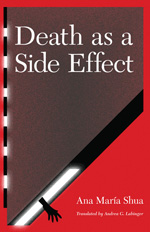
Ana María Shua's Death as a Side Effect is a perfectly pitched, darkly comic satire, set in a dystopian near-future Argentina. Politicians perform comedy routines on television, the streets are no-go areas, infested with gangs of marauding vandals, and neighbours are strangers, drowning out evidence of each others' presences with blaring music. Against this backdrop, Ernesto, a sometime make-up artist, script writer and undertaker who has lost his lover, is forced to take control of his family when his apparently terminally ill bully-of-a-father enters a sinister retirement home. Ernesto is effete and absurd. Although middle-aged, he is still mercilessly humiliated by his father, a charming monster. His sister, Cora, is equally ineffectual, and his mother's dementia means that Ernesto bears the burden of deciding his father's fate.
Shua's novel is short, but it contains a plethora of satirical barbs. Her dystopian vision of Argentina describes a place where society has ceased to function, and interactions with other people are filled with fear. However, her sights are chiefly set on the collapse of the nuclear family. Ernesto's family are no comfort to him, being a constant source of humiliation and a reminder of how little control he has over his own life. His father is brutally manipulative, and their interactions are told with a twisted Catch-22esque humour. Ernesto, the nursing home and Ernesto's father all battle for ownership of the right to control the latter's death. The nursing home offers a slow passing attended by stupefying medical care because, as the owner puts it, "I don't know how much your father's life means to you, but it means a lot to me because my job is at stake". Ernesto can only offer his father death, because he can no longer distinguish revenge and love where his family are concerned. His father, on the other hand, might just decide that he isn't really that ill after all.
Death as a Side Effect strikes a brilliant balance between the downbeat subject matter and the dark humour running
through the whole novel. It is absurd, bleak and funny. Ernesto is an everyman character who is both frustrating to
observe and easy to sympathise with, and his father is compelling and repellent in equal measure. For all its craziness,
Death as a Side Effect is an accessible satire about ordinary family life, and a book that should be added to those
holiday wish lists.

Univ. of Nebraska Press, paperback, 9780803229891 (December)
